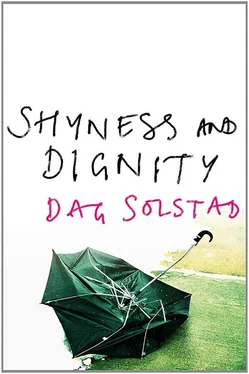Eva Linde lived her life in the apartment on Jacob Aalls gate, lying asleep behind the bedroom door as Elias Rukla sat up in the evening with his own thoughts. She went early to bed to be rested the next day, which for her included studies at the Social College, where her fellow students mostly belonged to a much younger generation than she did. Despite the fact that her beauty had badly faded, she was still an elegant lady. She knew how to dress, whether she went around in blue jeans, like her fellow students, or turned up in a grey suit and high-heeled shoes. An elegant lady, Elias Rukla could see that, as did also the others. Somewhat filled out, certainly, but an elegant, mature lady. She had, however, lost her charm for Elias Rukla, her husband. There had always been something affected about Eva, which he had loved. She had felt bothered by attracting men’s glances because of the way she happened to look, to be sure, but still she had not avoided becoming the prisoner of her own beauty. Though she had disliked the glances directed at her, she could not desist from reacting to them, and that she had done in such a charmingly affected manner. Her fragile beauty. Her whole manner had been based on her being perceived as indescribably beautiful. She had not been able to avoid playing up her beauty, because it was herself, after all, the way the outside world perceived her, and even though she did not regard it as having any value per se, and none at all to her, who of course couldn’t help it, her beauty was nonetheless what constituted her value and therefore had to be played up for her to attain any value at all. Forced to maximise her beauty, because she had had nothing else to maximise! And if she had had something else to play up, nobody would have cared about it anyway, at any rate when it came to comprehending her nature and being drawn towards it. She had known her value, in spite of not acknowledging it. When she looked at a man, she knew what it meant. She ought, therefore, not to look at men, but when she did she knew what it meant. That is, she knew she could look at a man and that it would cause, with almost the certainty of a law, the intended effect to occur. A chance thing and ridiculous, but that is how it was. When her beauty was gone, she knew that this would no longer occur automatically and that, consequently, she was spared having to deal with it. She was released from the prison of her beauty. Willy-nilly, she did not have to put on an act. Her beauty was gone and she could be natural. Not an affected woman, but a natural human being. She could appear as a straightforward and simple mature lady who impressed people with her courage and her determination to undertake a prolonged education at her age. Elias too. An elegant lady who wore blue jeans, like her young fellow students, or who could show up in a grey suit and high-heeled shoes whenever convenient, or appropriate to the weather. Her face a bit drawn, as an expression of a natural biological development that overtakes all, men and women alike, but which for a woman often means that she loses her fascination as exceptionally attractive, with often pathetic consequences if she does not realise this but fights it, trying to look like herself as a young girl instead of enjoying her life as shaped by biological rhythms. Elias Rukla could not deny that he was proud of his wife, and he often felt a hidden, but in reality deep, satisfaction to be living by her side, as he had already done for nearly twenty years. But not without missing her charm, or affectation, if you will.
It was a feeling that he could share with no-one. He could not tell Eva, I love your affectation, because she wouldn’t have cared whether he said so or not; it would have been a matter of indifference to her. He could have said, I like the way you toss your head right now (because it reminded him of the way the artificial Eva would toss her head, though not entirely, because now she was doing it by force of habit, without any connection at all to the game being played between a captive beauty and the men who were attracted by her, as before, but as a natural toss of her head, which nevertheless brought things back, reminding Elias of something he was searching for), and she would have liked it, although she would not have repeated her movement so that he would say it once more and she could hear him say it. For she was liberated from this now. But he missed what she had been liberated from and, in a strange way, felt it showed callousness on her part that he could not give expression to it.
All in all, Elias Rukla could not help catching himself thinking that Eva Linde’s naturalness had a callous tinge to it. Release from affectation showed sides to her suggestive of both indifference and greed. It was as though the demands beauty had made on her demeanour had tamed her natural inclinations. Perhaps there had always been these sides to her, without Elias Rukla seeing it, dazzled as he had been by her charm? What he had called being ‘spoiled’ or ‘pampered’ was perhaps an expression of precisely this, but when it appeared in a beautiful woman in her early thirties, say, it made a different, less direct impression than now, when the same appeared in a middle-aged lady close to fifty years old. On the other hand, it was quite clear that, insofar as Eva Linde freed herself from the tyranny of her own beauty, not unaided, but with the help of nature, one might say, this offered her the possibility of displaying her more vulgar sides, with the greatest pleasure at that, without having to pretend, but letting it all come out, unrestrainedly, like a natural human being. There could be no doubt that she was covetous. The way she would look at things owned by others with her drawn face showed a voracity that at times, quite simply, had a frightening effect on Elias Rukla, considering that he shared bed and board with her. Not the greed per se, but what it expressed and pointed to as far as their relationship was concerned. She was obsessed with things she did not herself own. When they were at a party she would loudly admire the hosts’ most exquisite articles, going back to look at them time and again and praising them in a loud voice, and the look she then cast at them was full of envy, something that was obviously appreciated by the hosts and made Elias Rukla set his mind at rest for a moment with the thought that she no doubt was doing it as a matter of politeness. But that wasn’t true. For she stood in exactly the same way when staring into the display windows of expensive boutiques for women’s clothes or exclusive furniture stores. She would stand there staring greedily at the luxury goods within. But she did not reproach him because they could not get these things for themselves. She did, however, show her greed for them, and when the greed lighted up her worn face and she stood there with her heavy, slightly overweight figure — to be sure, in her elegant grey suit — pressing her nose against the shop windows, it had a frightening effect on him. This glorious, no, uproarious female desire in a woman who did not play up her femininity but was simply an unaffected lady in her late forties. This craving for luxury that could never be satisfied and that, except when she peeked in someone else’s home or at the window displays, was never expressed as a wish for something she herself wanted to possess. Faced with this unaffected human being, who had renounced relating to her feminine artificiality but harboured such a voracious female desire, Elias Rukla was struck by a dreadful sense of estrangement, and he longed for what had been. Back to her graceful ways, which had captivated him as a matter of course and had therefore been a legitimate reason why he, Elias Rukla, could be close to her, but when she stood there, heavy-set and greedily staring, her nose flattened against the shop windows of luxury boutiques, he had in that moment no legitimate reason to be with her, and it was in the form of moments that this estrangement occurred to him. But at the same time he was struck by how dependent he had become on her, because when she stood there, craving all that luxury she did not express a single wish to obtain for herself, from him, but which she showed him she was fervently dreaming about all the same, even though she did not want it because it was impossible, he knew that, if she did not soon show him a bit of friendliness and trust that could offset this spectacle, well, the suspicion that this was the true expression of her real life, or that this greed for luxury was just a corner of this secret life that was turned away from him, but that she now all but demonstratively displayed to him, then his uneasiness vis-à-vis her would really destroy him. Was she sorry? As she stood there with her nose flattened against the window, an elegant, but rather drawn and flabby, wife in her forties?
Читать дальше










